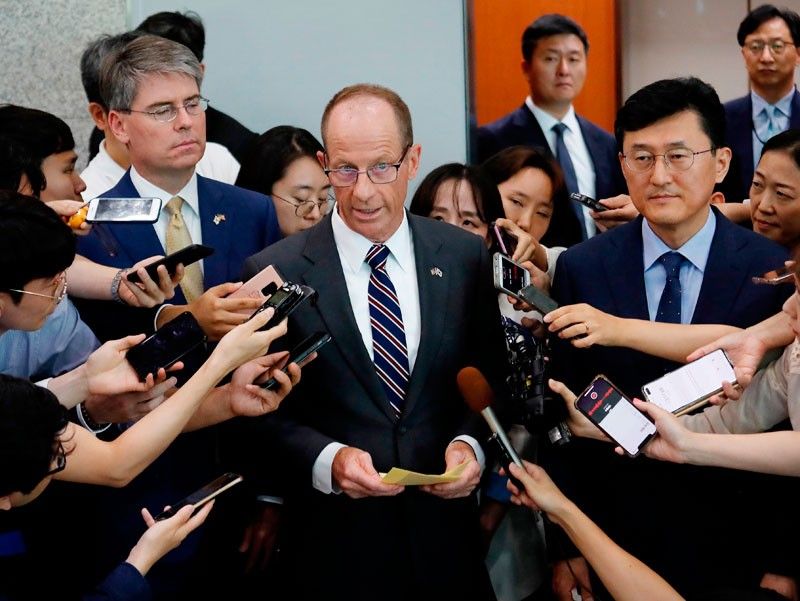China can’t ignore multilateral resistance — US

MANILA, Philippines — “Multilateral resistance” from the United States and its allies against China’s militarization in the South China Sea is something Beijing cannot ignore, said a State Department official.
“We’re strongest when we coordinate with like-minded allies and others,” said US Assistant Secretary of State for East Asian and Pacific Affairs David Stilwell in an interview with NHK in Tokyo before he flew to Manila for the 8th US-Philippine Bilateral Strategic Dialogue. The two-day dialogue concluded on Tuesday.
“And when more than one country pushes back and resists these things, multilateral resistance is impossible for the PRC (People’s Republic of China) to ignore and has proven very effective in the past,” Stilwell said.
“We don’t have to solve it immediately. The trend is positive, and we’ll keep working at it,” he pointed out.
His interview happened on the third anniversary of the Philippines’ winning its legal case against China before the Permanent Court of Arbitration based in The Hague.
In its ruling, the PCA invalidated China’s expansive claim over the South China Sea and upheld the Philippines’ maritime entitlements. Beijing has vowed not to comply with the ruling, calling it a “mere piece of paper.”
The US emphasized the tribunal’s decision is “final” and “legally binding.”
Stilwell, who also visited Thailand and South Korea before coming to Manila, cited the United Nations’ own concerns over the raging maritime dispute. The international body has also appealed to parties involved not to resort to unilateral action.
The State Department official said the lighthouses and supposed shelters for fishermen in the South China Sea are “very clearly military facilities.”
“Unfortunately those islands start off as simple features, and in spite of being labeled as lighthouses and shelters for fishermen, they very clearly are military facilities. That narrative has changed over time. We kind of all knew that it was, and sure enough it became what we thought it was going to be – airbases, ports and military facilities,” Stilwell stressed.
Asked about China’s test-firing of missiles, he said, “As China feels its strength growing –economic and military strength – there’s this sense that it’s going to use that strength to drive its own agenda.”
“Fortunately you have not just one country, but all countries in the region are expressing concern. ASEAN as a group are expressing concern at these activities,” he said, referring to the 10-member Association of Southeast Asian Nations.
“So I think we should take a big step back and look at the trends in the region, not the individual incidents, and we see something that’s not in the interest of all of us. And you’re seeing the people push back, so that’s good,” he added.
Washington earlier called China’s missile tests “provocative” and “inconsistent with international law and practices.”
China claimed the “shooting exercises” near Hainan were “not meant to intimidate” its smaller neighbors with claims over land features in the South China Sea.
Stilwell also expressed support for Japan’s exercising freedom of navigation and overflight in the South China Sea.
“Japan has an interest in free flow of goods, and energy certainly, through the South China Sea. And so it’s in Japan’s interest, it’s in the US interest and it’s in the alliance’s interest to make sure that any further attempts to nationalize or control that – you have an interest in doing that, so it’s a good thing,” Stilwell said.
Might makes right
He added that what the world finds alarming now is China’s governance concept of “big-power, might-makes-right approach and dictating terms to others.”
“I would say that the most important issue with respect to China in the region, and I think globally, is the idea of governance,” he said.
China, under President Xi Jinping, appears to be trying to change established world order that is conducive to dialogue.
“If you look at what he (Xi) has said officially in all these areas, it’s that they want to change the way the world operates, this system that has developed over the last 70-something years that accommodates the interests of everyone,” Stilwell said.
“He wants to adjust that to accommodate the interest of the PRC. That itself is not a bad thing. As I said, the situation changes and we need to adapt to that,” Stilwell said.
“Unfortunately there is a sense of changing things to reflect the way government happens inside China, which is a totally different approach than what exists now,” he maintained.
“You know, in the region we have a system where, big country, small country – all treated the same. The UN – it levels the playing field for all countries,” he added.
“My concern is that this governance concept that China is pushing right now is a big-power, might-makes-right approach, and maybe dictating terms to others. So we need to understand that better, and I think we need to address that,” Stilwell emphasized.
A US report on China’s military said that the Asian giant, benefiting from the “period of strategic opportunity,” is willing to employ coercive measures – both military and nonmilitary – to advance its interests and mitigate opposition from other countries, as it aims to achieve the status of “world-class” military by 2049.
This was highlighted in the latest annual report on military and security developments in China, also referred to as the China Military Power Report, submitted by the United States Department of Defense to Congress.
“China’s leaders have benefited from what they view as a ‘period of strategic opportunity’ during the initial two decades of the 21st century to develop domestically and expand China’s ‘comprehensive national power,’’’ the 2019 report said.
- Latest
- Trending



























